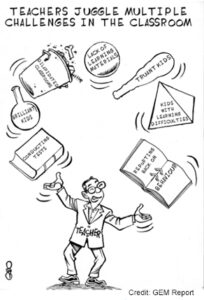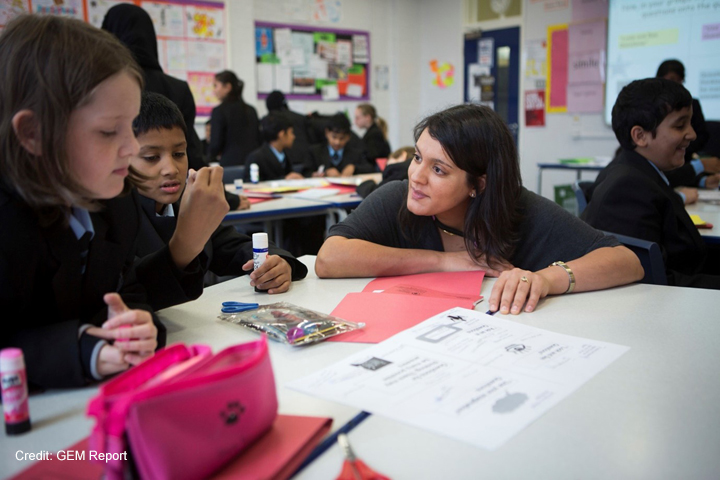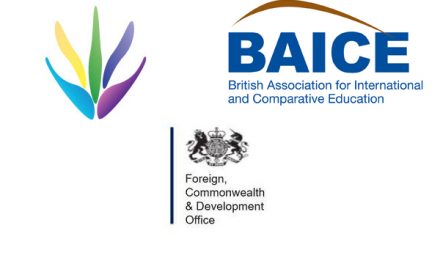This blog was written by Kevin Courtney, General Secretary of the National Education Union, UK. Kevin was a panellist at the UK launch of the 2021/22 Global Education Monitoring (GEM) Report on non-state actors, organised with UKFIET on the 2 March online and in London. This blog was originally published on the GEM Report’s World Education Blog on 30 March 2022.
England’s school system has undergone a radical transformation since 2010 with thousands of schools transferred into the control of private organisations called academy trusts. These are hybrid organisations – not-for-profit private trusts subject to company law which receive state funding but operate via a contract with central government, rather than a relationship with the local authority. Many different types of organisations have set up academy trusts, from large commercial companies, to churches, universities and wealthy private individuals.
Currently, around 80% of English secondary schools and nearly 40% of primary schools are academies. Although some trusts run ‘stand-alone’ academies, most academies are now in ‘chains’, known as Multi-Academy Trusts (MATs). The trend is towards consolidation into larger MATs, where a single trust board can be responsible for many schools – the largest MAT has more than 70 schools. A forthcoming government White Paper is likely to assert the government’s wish for all schools in England to become academies within MATs.
This trend has fragmented the English school system, weakened and undermined democratically accountable local authorities, boosted the power of private actors, and increased scope for profiteering and commercial exploitation.
Where once there was a single local state employer, now many academy trusts can operate in one area. This has undermined local collective agreements and accelerated deregulation of school staff’s terms and conditions, increasing the use of performance related pay. Average pay for teaching staff in academies is lower, but higher for senior management, with sky high salaries for some ‘leaders’ of academy trusts.
Academisation has also radically reduced the voice of local communities, parents and staff in the English school system. Once a school joins a MAT it cannot leave to return to the local authority or even choose another trust. Schools are absorbed into MATs, or are transferred between them, with no input from or even consultation of the communities they serve. Whereas local authority schools are required to have two elected parents on their boards of governors, there is no such requirement for academy trusts. Indeed, some MATs have even abolished their local governing bodies. Independent staff representation is also not required in MAT governance structures.
However, to understand the full impact of academisation, the policy should be seen as a fundamental part of a wider set of neoliberal education reforms which promote school choice, marketisation and competition as well as top-down forms of high stakes accountability.
Converting schools to academies, according to government dogma, is supposed to bring in the virtues of competition, choice and also – as its proponents see it – schools that are free from the restrictions and backwardness of the local state.
All this is supposed to boost results but even by this metric MATs have not succeeded: there is no evidence that academies outperform local authority schools. Echoing the same findings in the 2021/2 GEM Report on non-state actors at a global level, research by the Sutton Trust has found that two thirds of academy chains in the UK perform below average for disadvantaged pupils.
Meanwhile, academies are making the school system more centralised and top down – with a greater role for central government.
It is worth considering the results of a four-year study by academics from University College London (UCL) evaluating the impact of recent government reforms – encompassing academies and the operation of high stakes forms of accountability – which concluded that schools are more tightly regulated than ever, facing pressure to get good exam results and grades by Ofsted, the inspection authority, or face being taken over by a MAT.
Two-thirds of the 700 head teachers surveyed for the study agreed that inequalities between schools are becoming wider as a result of current government policy.
 As the UCL study shows, this has very negative consequences for education staff. One aspect of this is the narrowing of the curriculum and ‘scripted teaching’: academy chains are often at the vanguard of promoting standardised teaching methodology and pupil assessment, which undermines teachers’ professional autonomy and ability to employ their own pedagogical approaches.
As the UCL study shows, this has very negative consequences for education staff. One aspect of this is the narrowing of the curriculum and ‘scripted teaching’: academy chains are often at the vanguard of promoting standardised teaching methodology and pupil assessment, which undermines teachers’ professional autonomy and ability to employ their own pedagogical approaches.
Academies often have excessive accountability mechanisms in place – such as learning walks, book checks and constant teacher observations. These fuel excessive workloads, which are driving teachers out of the profession. They also undermine professional autonomy over teaching and learning.
Academies also undermine teacher professionalism as they can employ unqualified teachers. A 2019 study found academies were more likely than other schools with pupils from poorer backgrounds to hire more teachers without qualified teacher status.
Some academy chains have also adopted very strict and punitive behaviour policies which staff are expected to enforce. These policies have the dual effect of fuelling high levels of exclusions of those children who are classified as having special educational needs or who are seen as ‘not fitting in’, but also undermine more progressive pedagogical approaches to behaviour management.
As a trade union, the NEU is fighting back against the pernicious effects of the academies policy by empowering our members to take action when their school is being threatened with academisation. We also support members in academies to fight for and maintain better terms and conditions in academies, including the roll back of performance related pay.
 An equitable system also needs to see the end of high stakes exams and the pressure of Ofsted. The NEU is campaigning for fundamental changes to the curriculum and assessment system. As part of this, the NEU has been working for the past year alongside academics, parents and students to support the Independent Assessment Commission, to build a new, fairer and more robust assessment and qualification system at secondary level.
An equitable system also needs to see the end of high stakes exams and the pressure of Ofsted. The NEU is campaigning for fundamental changes to the curriculum and assessment system. As part of this, the NEU has been working for the past year alongside academics, parents and students to support the Independent Assessment Commission, to build a new, fairer and more robust assessment and qualification system at secondary level.
While academies are an English phenomenon, it is important to see how the policy and its priorities connects to what is happening across the globe.
It is worth noting that Ark, a MAT of 39 schools in England, has an international arm that advises governments how to outsource management of public schools, for instance in Liberia and South Africa. This is mentioned in the 2021/2 GEM report and is also highlighted in the NEU’s report In whose interest? The UK’s role in privatising education around the world. The research shows that Ark has also been involved in advising the UK government on public-private partnerships through its Education Partnerships Group.
These connections show us that the drive to greater privatisation and marketisation in public education is a global movement. The NEU welcomes the spotlight shone on these trends by the GEM Report and will continue to advocate for public education to protect and promote equity and inclusion.






Is there any chance of all non academy schools being able to contact each other to give strength to any school feeling pressure to become an academy?
Governors,headteachers etc need reassuring that they are not alone but have many like minded schools who are on their side.
Regards,Graham Huckstep…headteacher,St Andrew’s CofE Primary School,Hull
Hi Graham
We’ve organised joint NEU and NAHT meetings in some areas gathering heads and governors together. I think they’ve been useful, do you think thrr are t would work well in Hull/East Riding?
I’ve worked in the IT sector of Education for over 10 years and i can honestly say i have only seen negative effects of schools becoming multi academies. While Single academies have their issues they are far more open to the needs of students and staff. While every and i mean every experience i’ve had with Multi academies have been awful. From them ousting staff out of jobs because they don’t fit to Adding every child to a leaderboard and rating them from top to worst regardless of and special educational needs. I’ve also seen schools desperate for cash injections that had balanced books before they joined now can’t purchase the most fundamental things such as rubbers or pencils. The funding is restricted and schools need to fight tooth and nail to get anything done to improve teaching and learning.
I’ve witnessed Qualified IT Technicians be scrutinized on multiple occasions about why they are completing tasks and essentially undermines their abilities to the point they go off with stress and leave. (Which is exactly what the MAT wanted so they could go to an external company and get a deal for the wider trust.
Staff are treated like they don’t count and students even more so. Any care for students wellbeing has been stripped out of most MAT schools (Especially seconadry schools) They remove the responsibilities in place for young adults. (Lunch time passes for older students have been revoked and they are no longer able to leave site. They must confirm to walking down corridors in silence in straight lines. If you drop a pen or pencil in class and don’t ask to pick it up the student is sent to isolation. I’ve witnessed children in hysterics because they did something deemed against their policies and end up in isolation. The students are expected to be drones and any individuality is stamped out. The students are inspected at the start of the day and if they have the wrong socks they get sent home.
It’s really a tragedy that schools are now Prison houses for kids for 6 hours a day. Gone is the care that the education sector was known for. Now it’s about whether exam results are up or not and if not they need to rid the school of the ones that aren’t academically minded or struggle just to make the results look better.
One MAT i was part of was also in discussions about creating a Pru school to send all their worst students. They arrive at their original school in the morning then would be ferried across using school vehicles to the Pru school. Essentially moving all under proforming students to the Pru to make all other schools look better on the leaderboard.
It’s wrong on so many levels and any teacher wanting to go in to education to help kids is finding this is no longer education but a business. The business of bleeding the educational system dry with high salaries for board members then saying they have no money to help the schools.